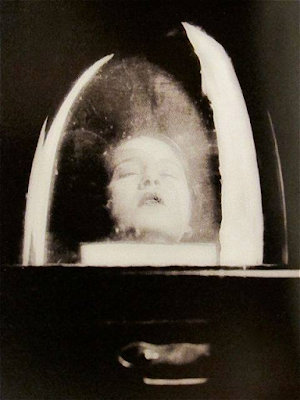 |
| Lee Miller's photo of Tanja Ramm's head 'in' a Bell Jar taken in Paris in 1931. I wonder whether Sylvia Plath had this iconic picture in mind when she entitled her novel. |
The more I read the more I find wonderful books that make me wonder why I hadn't read them a long, long time ago. Of course I had heard of the Bell Jar but I had avoided it. The author had been the wife of the British poet Ted Hughes. We had to read his poems at school (because they were about animals which were supposed to appeal to us).
It is a novel about an American girl who has a nervous breakdown, attempts suicide and winds up getting electric shock treatment in a mental hospital. I suppose it is a sort of Voyage and Return (as described by Christopher Booker in The Seven Basic Plots); the voyage into madness being the liminality.
The first half of the book (46%) concerns Esther's stay in New York where she had one a prize and has a month in a hotel as a guest of a magazine (with a lot more girls). She has always dreamed of being a writer. She parties, remembers her boyfriend, gets food poisoning, and parties some more. I loved this section of the book. The writing was crisp and witty with some wonderful observations told in the way that only a poet can. Then she goes back home to live with her mother. She is rejected from the college summer vacation writing course so she has nothing to do. Her boyfriend (she doesn't really like him and she is determined never to marry him since she has discovered he has had an affair with a waitress) who is a medical student has contracted TB and is in a sanatorium. She stops washing and stops sleeping. She starts working out ways to kill herself. Finally she takes a bottle full of sleeping pills but she is found alive and put into a mental hospital.
Selected quotes:
- "It was a queer, sultry summer, the summer they electrocuted the Rosenbergs, and I didn't know what I was doing in New York. I'm stupid about executions. The idea of being electrocuted makes me sick, and that's all there was to read about in the papers - goggle-eyed headlines staring up at me on every street corner and at the fusty, peanut-smelling mouth of every subway. It had nothing to do with me, but I couldn't help wondering what it would be like, being burned alive all along your nerves." (Ch 1: a brilliant first paragraph, fabulously foreshadowing her electro-shock treatment at the mental hospital.)
- "I felt very still and very empty, the way the eye of a tornado must feel, moving dully along in the middle of all the surrounding hullabaloo." (Ch 1)
- "The silence depressed me. It wasn't the silence of silence. It was my own silence." (Ch 1)
- "The china-white bedside telephone could have connected me up with things, but there it sat, dumb as a death's head." (Ch 2)
- "I think I still expected to see Doreen's body lying there in the pool of vomit like an ugly, concrete testimony to my own dirty nature." (Ch 2)
- "If you do something incorrect at table with a certain arrogance ... you can get away with it." (Ch 3)
- "I'd happened to be dealt to him, like a playing card in a pack of identical cards." (Ch 9)
- "A man in the country club stepped up to the mike and started shaking those seedpod rattles that mean South American music." (Ch 9) (See, she can be funny as well!)
- "Women-haters were like the gods: invulnerable and chock-full of power. They descended and then they disappeared. You could never catch one." (Ch 9)
- "The white, shining, identical clapboard houses with their interstices of well-groomed green proceeded past, one bar after another in a large but escape-proof cage." (Ch 10)
- "The voice on the loudspeaker went bockle bockle bockle, the way they do, so you can't understand a word, and then, in the middle of all the static, I heard a familiar name clear as A on the piano in the middle of all the tuning instruments of an orchestra." (Ch 11)
- "His name was Cal, which I thought must be short for something, but I couldn't think what it would be short for, unless it was California." (Ch 13 - more laughter)
- "The more hopeless you were, the further away they hid you." (Ch 13)
- The crazy nun "kept hearing harp notes in her ears and a voice saying over and over, 'Alleluia!' Only she wasn't sure, on being closely questioned, whether the voice was saying Alleluia or Arizona." (Ch 13 - I laughed out loud at this point, something very very few books make me do).
But the best thing about this wonderful book is the beautiful prose.
Rated 85th in The Guardian's 100 best novels of all time
April 2016; 234 pages
April 2016; 234 pages
No comments:
Post a Comment